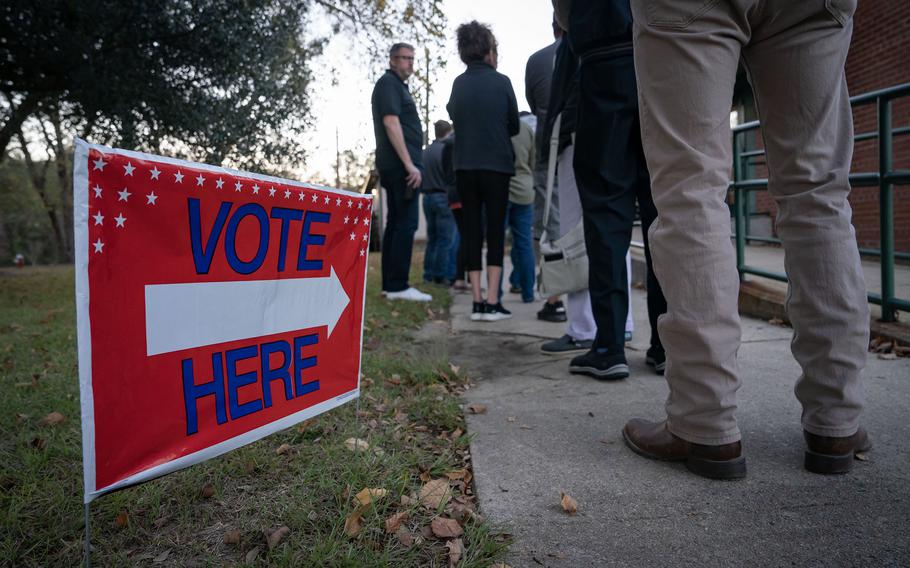
People wait in line to vote at a polling place on Nov. 8, 2022, in Fuquay Varina, N.C. (Allison Joyce, Getty Images/TNS)
WASHINGTON — An Iran-backed website called “Not Our War” is targeting U.S. veterans and active-duty service members with a disinformation campaign that is part of a broader effort to influence American voters before the November election, according to a Washington think tank.
The nonprofit Foundation for Defense of Democracies issued a report warning of attempts by Tehran to present false content for American audiences that is critical of the U.S. election process and U.S. foreign policy.
The Iran-backed website is part of a larger network of about 20 websites purporting to cover U.S. politics and election issues with content tailored for specific readers, including veterans, Black voters and people who are Spanish-speaking, the organization said.
“Iran is attempting to pass off as legitimate news outlets [through] a series of websites it controls, attempting to trick Americans into consuming Iranian propaganda,” the report said. “These websites attempt to portray themselves as authentic, local voices but are likely run by Iranian operatives.”
The Foundation for Defense of Democracies, which conducts research on national security and foreign policy, published its report in September titled “How U.S. Adversaries Undermine the Perception of Election Integrity.”
A focus of the report was the website, notourwar.com, which has a dedicated tab for U.S. military veterans.
Max Lesser, senior analyst at the foundation, said a goal of the content is to cause U.S. veterans to feel disaffected with both major presidential candidates and disillusioned with American democracy more broadly.
“Not Our War is one of the most explicitly pro-Iran websites in the network, with one article alleging that the United States is secretly researching a weather-controlling weapon meant to curb Iran’s geopolitical supremacy,” the report said. The site also contains hundreds of embedded back links that connect readers to explicit anti-American websites, some of them in Arabic.
Lesser said “Not Our War” shared a number of technical features, such as shared web hosting infrastructure, with other known Iranian-influenced websites.
“This domain includes overtly pro-Iran [content], with one article even claiming that Iran has ‘geopolitical supremacy,’ ’’ he said.
The foundation’s report follows a pair of alerts from Microsoft and the global security firm Mandiant about a larger effort by foreign state actors to influence the presidential election in November.
In an intelligence briefing to the U.S. Election Assistance Commission, Mandiant warned in March that the “Not Our War” website was part of a pro-Iran “propaganda ecosystem” with a focus on cultivating an audience of veterans and active-duty service members.
The website content commends the Iranian government, its political interests and leaders, according to Mandiant, a subsidiary of Google.
Content on the website is specifically critical of U.S. military operations in the Middle East. A news story published on the website in February described the U.S. presidential campaign as “the clash of two doddering fools” casting a shadow over Middle East politics.
The website praises Russian President Vladimir Putin and raises conspiracy theories about U.S. elections and the voting process. It appears to be registered in Germany, uses a proxy server that makes internet activity untraceable and enables its originator to remain anonymous. The registrar is Public Domain Registry, a subsidiary of Endurance International Group Holdings in India.
The Foundation for Defense Democracies’ report also stated it identified more than 2,000 Iran-backed social media accounts on the social media website X, formerly Twitter. The accounts post content about the U.S. election, primarily in the Persian language. Several accounts use false pictures that appear to have been generated by artificial intelligence.
The House Veterans’ Affairs Committee in 2020 sent a report to the entire lower chamber raising concern about foreign state actors targeting veterans ahead of national elections.
Titled “Exploiting veterans through disinformation on social media,” the report discussed the growth of online influence campaigns originating outside the U.S. to influence elections. The report specifically looked at online misinformation campaigns that seek to reach veterans and military service members to “misappropriate” their perceived credibility and authority.
“If individuals or groups are able to influence elections with false narratives, the faith in the electoral process is undermined,” according to the House report.